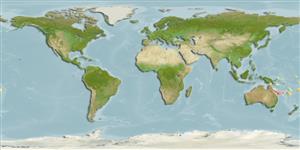分類 / Names
共通名の | 類義語 | Catalog of Fishes(部類, 種) | ITIS | CoL | WoRMS | Cloffa
>
Callionymiformes (Dragonets) >
Callionymidae (Dragonets)
Etymology: Synchiropus: Greek, syn, symphysis = grown together + Greek, cheir = hand + Greek, pous = foot (Ref. 45335).
Environment: milieu / climate zone / depth range / distribution range
生態学
海 深海魚; 深さの範囲 ? - 380 m (Ref. 40966). Deep-water
Western Central Pacific.
サイズ / 重さ / 年齢
Maturity: Lm ? range ? - ? cm
Minimum depth from Ref. 58018.
Life cycle and mating behavior
Maturities | 繁殖 | Spawnings | Egg(s) | Fecundities | 幼生
Fricke, R., 2001. Callionymidae. Dragonets. p. 3549-3571. In K.E. Carpenter and V. Niem (eds.) FAO species identification guide for fishery purposes. The living marine resources of the Western Central Pacific. Vol. 6. Bony fishes part 4 (Labridae to Latimeriidae), estuarine crocodiles. FAO, Rome. (Ref. 42832)
Human uses
用具
特記事項
XMLをダウンロードして下さい
インターネットの情報源
Estimates based on models
Preferred temperature (Ref.
123201): 17.5 - 20, mean 18.9 °C (based on 9 cells).
Phylogenetic diversity index (Ref.
82804): PD
50 = 0.5000 [Uniqueness, from 0.5 = low to 2.0 = high].
Bayesian length-weight: a=0.01000 (0.00244 - 0.04107), b=3.04 (2.81 - 3.27), in cm total length, based on all LWR estimates for this body shape (Ref.
93245).
栄養段階 (Ref.
69278): 3.4 ±0.4 se; based on size and trophs of closest relatives
回復力 (Ref.
120179): 高い, 15か月以下の倍増期間の最小個体群 (Preliminary K or Fecundity.).
Fishing Vulnerability (Ref.
59153): Low vulnerability (10 of 100).
